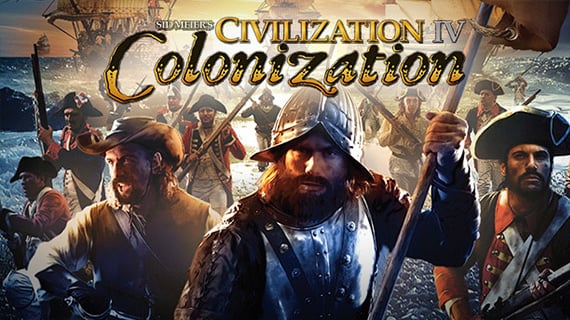
Sid Meier’s Civilization IV: Colonization
It’s fascinating how much difference a bit of context makes. Civilization players have been placing cities right next to their opponents’ and saying, “This is mine, because I’m bigger and have guns” for years without issue, but Civ plays on a randomly-generated map with functionally-identical factions. Colonization, on the other hand, explicitly puts players in control of European settlers and gives central importance to their interactions with indigenous populations. It’s uncomfortable, to say the least. But does the open-ended nature of the gameplay relieve that discomfort? To a degree, maybe. Carrying out alternate history scenarios, including ones with fair trade and mutually beneficial alliances, could be argued to be the whole point. That said, when a game’s description must be qualified with “You don’t have to recreate the real-life genocide,” some level of discomfort is unavoidable.
Analyzing the game at a deeper level reveals inconsistent and likely inadvertent messaging within its mechanics. Looking at it purely in gameplay terms, it’s often easier and more immediate to simply take land and resources by force, but there are usually greater long-term benefits to peaceful coexistence. Conversely, the fact that every playthrough is required to end with a desperate military struggle for independence frames any colonial misdeeds as acts of necessity. Players are encouraged to loot burial grounds for treasure, but doing so has a chance of incensing the local population and inflicting damage instead, because looting burial grounds is what historians call a dick move. Meanwhile, the culture mechanics imported from Civilization IV all but guarantee that most unconquered indigenous settlements will happily assimilate into colonial society by the end of the game, implying that something similar would have happened in real life, which is a…bold statement. All of this is to say nothing of the infamous omission of the role that slavery played in colonialism. Unfortunately, I am not remotely qualified to determine whether it’s more offensive to exclude the Atlantic slave trade or to use it as a game mechanic.
What I am qualified to judge is the quality of the game itself, and if the last two paragraphs are any indication, I find it more interesting to think and talk about than to play. It is a completely unique game outside of the one it’s a remake of; 4X strategy usually values openness above everything, so the organically structured progression from small dependent to emboldened rebel faction is rather curious. Furthermore, I find its interlocking systems of immigration, industry, politics, and trade to be intellectually satisfying just to observe. And of course, the gameplay is largely cut from the Civ cloth, so there will be plenty of “just one more turn” moments. Unfortunately, the structure that gives the game its identity is also its undoing. Since players must achieve independence militarily, any actions that don’t directly assist with that goal are a waste of time. Time is a scarce commodity too, so the gameplay, however engaging, is also indelibly stressful.
All of this was true with the original 1994 release to a degree, but it’s exacerbated in this 2008 remake (which is also a standalone total conversion of Civilization IV, confusingly). The royal army you’re expected to repel is substantially more numerous, while your methods of doing so are fewer and less nuanced. Among other things, terrain effects are diminished, and you can no longer beseech other monarchies for assistance. Essentially, while the original Colonization mostly avoided the “stacks of doom” combat problem of Civ, this version wholly embraces it. This isn’t to say that the remake is entirely inferior; the interface and production values are obviously improved from both an artistic and practical perspective. The new multiplayer component adds nothing to the experience, however, as every turn spent combatting opponents is a turn that wasn’t spent preparing for revolution.